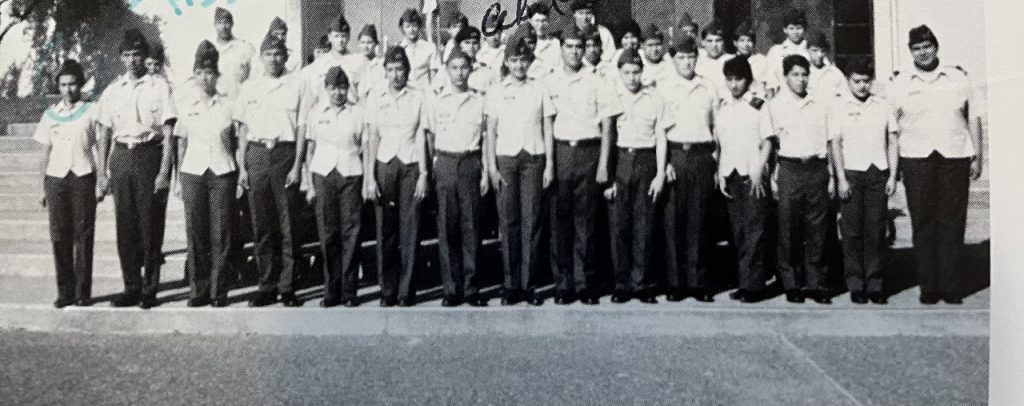History Peeps – Dr. Sonia Hernandez, Associate Professor of History

Dr. Hernández, far left, front row, as a JR ROTC high school student in Pharr, Texas.
As a professor of the US-Mexico Borderlands, Dr. Sonia Hernández’s enthusiasm for history is deeply personal. The child of Mexican immigrants, Hernández was the first member of her family born in the United States. She remembers growing up in a colonia or unincorporated town of the Rio Grande Valley near McAllen, Texas. She was first drawn towards her scholarship by a desire to better understand her own family’s past and how the intersection of Mexican and American history influenced their story.
Dr. Hernández argues that educators should seek first and foremost to spread conocimiento, a word that denotes awareness of a historical figure’s idiosyncratic experiences. Her goal is to help students see the contemporary value of learning history and to situate their own personal stories within a larger historical narrative. Her most recent publications include For a Just and Better World: Engendering Anarchism in the Mexican Borderlands (2021 with the University of Illinois Press) and co-edited an anthology, Reverberations of Racial Violence: Critical Reflections on the History of the Border (2021 with the University of Texas Press); Hernández is working on her third monograph, “Por un Compatriota”: Transnational Networks, State Violence, and the Case of Gregorio Cortez” that examines the tragic history of state-sanctioned violence including the race-based lynching of ethnic Mexicans in the US-Mexico Borderland from a gendered, labor, and greater norteño perspective.
Dr. Hernández has been a professor at Texas A&M for eight years and remembers being drawn to the university for its committed support for Latina(o) studies. At most public university, it’s rare for a history department to have more than one expert on this subfield. By contrast, the TAMU History Department boasts five professors whose expertise is listed as “Latinx & Mexican American.” It also participates, in conjunction with other departments in the liberal arts college, in a Chicano and Chicana working group for graduate students and faculty to discuss their research and meet likeminded scholars. Influenced by her maternal grandfather’s career as both rancher and musician, Dr. Hernández is also a regular on the dance floor since her days in public school. She says she loves dancing to “country, Tejano, conjunto, pop, or really any other genre of music that’s being played”.
To what historical figure would Dr. Hernández like to say “Howdy” if given the chance? She would like to meet Texas State House Representative Jose Tomas ‘JT’ Canales. Canales was the only Mexican American Texas state legislator in 1919 when he led a movement to investigate unprovoked violence by the Texas Rangers against Tejano Americans. Opponents denounced him as a disloyal Texan and even a “greaser from Brownsville,” but the Canales Investigation would go on to produce overwhelming evidence of Ranger misconduct. Shocked into action, the legislature reconstituted the Rangers as professional police force with safeguards to prevent future violence against Tejano communities. As a figure she admires for his steady resolve even when attacked, Dr. Hernández would want to ask him “how it felt, as a powerful legislator, to have his professionalism and citizenship questions just for being Mexican American and how he maintained his calm demeanor.”
(Patrick Grigsby)
